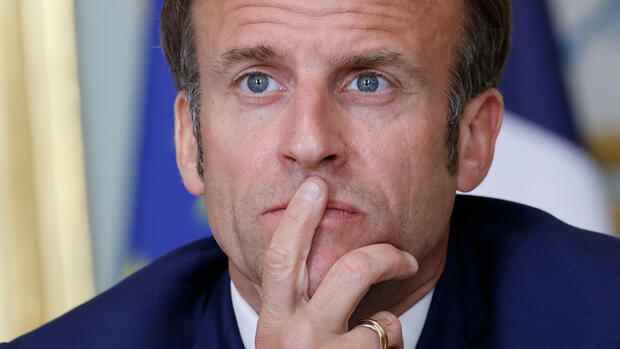The French prime minister wants to keep his promise – and fight inflation.
(Photo: dpa)
Paris French President Emmanuel Macron had promised to make inflation concerns the first priority of his new term in office. On Thursday, his government presented the eagerly awaited draft law to strengthen purchasing power – combined with a supplementary budget to finance the €20 billion bundle of measures. Meanwhile, in France, calls for a return to a more sound fiscal policy path were mounting.
“In the face of inflation, we have a duty: we have to react and protect the French,” said Prime Minister Elisabeth Borne. Among other things, the government wants to limit the rise in rents.
The possibility for companies to pay their employees a tax-free purchasing power premium is to be expanded. Around eight million low-income households are to receive a food check in September to cushion the rise in living costs.
The tank discount, which previously applied to prices directly at the pump, is to be phased out gradually. Instead, from October 1st there will be a fuel allowance that employees can apply to the tax office under certain conditions.
Top jobs of the day
Find the best jobs now and
be notified by email.
It is also planned to adjust the salaries of state employees, pensions and a number of social benefits to the increased price level. The French should also no longer have to pay broadcasting fees; the public radio and television stations are to be financed from the state budget in future.
The law follows on from measures already taken
The Purchasing Power Act follows on from measures that have already been taken, such as the capping of electricity and gas prices. However, it is questionable whether and in what form the law will be passed. Macron’s government lost its absolute majority in the National Assembly in June’s parliamentary elections.
In her government statement on Wednesday, Borne had promised to bring public finances “on the path to balance”.
(Photo: IMAGO/PanoramaC)
The attempt to form a coalition failed. The government’s plans are likely to be changed in the negotiations with the opposition – and possibly become even more expensive.
In her government statement on Wednesday, Borne had promised to bring public finances “on the path to equilibrium” and to bring the budget deficit back below the three percent threshold of gross domestic product (GDP) by 2027. But there are doubts about this goal, including the French Court of Auditors.
In a report published on Thursday, the controllers of state finances wrote: The deficit of five percent expected for 2022 is “largely of a structural nature” and the targeted reduction is a “complex” task.
>>Read here: Prime Minister Élisabeth Borne waived the vote of confidence
The budget development is characterized by “significant uncertainties”. Weaker growth or expensive political projects could push the deficit higher. It can already be assumed that this year’s expenditure will be almost EUR 60 billion higher than originally planned.
National debt at more than 2.9 trillion euros
The French national debt was recently more than 2.9 trillion euros. No other country in the euro zone is so deep in the red in absolute terms. The level of debt, which is currently almost 115 percent of GDP, is also a concern for François Villeroy de Galhau.
>Read here: The complicated situation of Emmanuel Macron
The head of France’s central bank emphasizes the need for far-reaching aid packages during the corona crisis, which led to a skyrocketing debt burden in all European countries. In the fight against price increases, France must now take “targeted and temporary measures”.
“In the long term, the effective solution to inflation is not fiscal policy but monetary policy,” Villeroy wrote in a letter to Macron published on Thursday. French politicians must deliver an “ambitious” debt reduction strategy. “Our political credibility in Europe is at stake,” warned the head of the central bank. “And our ability to maintain investor confidence.”
More: France wants to completely nationalize electricity company EDF
